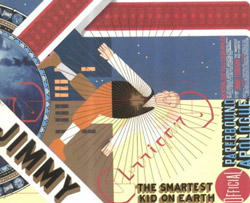By Chris Ware
 For the past fifteen years, comic books have been striving
to put the label "for children" behind them and produce mature
fare. Many of my favorite graphic novels accomplish this deftly - Sandman, Preacher, Watchmen,
etc. But they still have one leg in comic's classic realm of fantasy/science
fiction. Ware breaks out of that constraint completely, producing an
epic on par with Spiegleman's Maus and the works of Will Eisner.
Not only is this book not aimed at children, but you get the feeling
that any young reader who stumbled across it wouldn't be able to stay
awake for more than a page. The book requires patience, but it pays off.
For the past fifteen years, comic books have been striving
to put the label "for children" behind them and produce mature
fare. Many of my favorite graphic novels accomplish this deftly - Sandman, Preacher, Watchmen,
etc. But they still have one leg in comic's classic realm of fantasy/science
fiction. Ware breaks out of that constraint completely, producing an
epic on par with Spiegleman's Maus and the works of Will Eisner.
Not only is this book not aimed at children, but you get the feeling
that any young reader who stumbled across it wouldn't be able to stay
awake for more than a page. The book requires patience, but it pays off.
Jimmy Corrigan is neither a kid nor the smartest person
on earth, far from it. He's a washed-out fifty-year-old loser with no
life and such an acute fear of human interaction that he is often paralyzed
when he tries to speak. The story follows his reluctant quest to meet
his long-lost father. The main themes that Ware develops here have to
do with father-son relationships, and how their characteristics are passed
down through generations. To illustrate this theme, Ware usees extended
flashback scenes to Jimmy's ancestor in the 1890's, a young boy whose
status as a social outcast is eerily similar to Jimmy's. To say that
their plights are agonizing is an understatement. But Ware delves completely,
utterly, successfully into their worlds.
Though the psychological themes and characters of the
book are its greatest feature, Ware's artwork is also remarkable. Meticulous
is the only word for it. Not a line is out of place; in fact, every single
panel looks like it was drawn with a T-square and compass. His depictions
of the 1890 Chicago World Fair are stunning, but the emphasis he gives
to facial features and everyday objects is at the core of the book. I've
never read a comic with so much crammed in, and this took some time to
read. But, like I said, it was worth it. Ware presents a true masterpiece
- a meticulously-crafted century of one family's struggle with mediocrity.